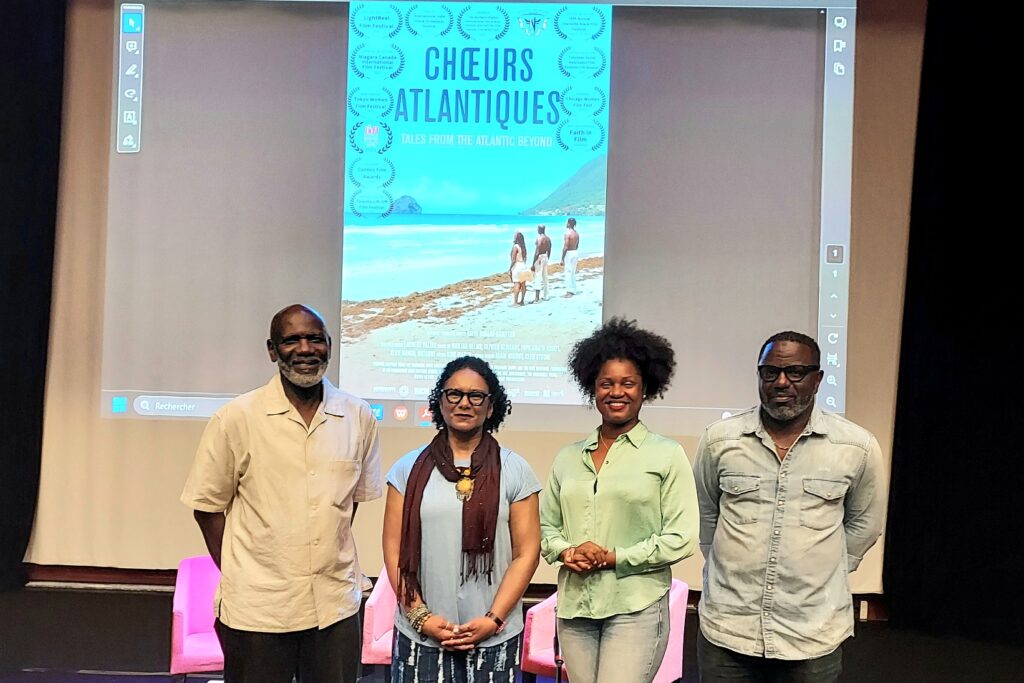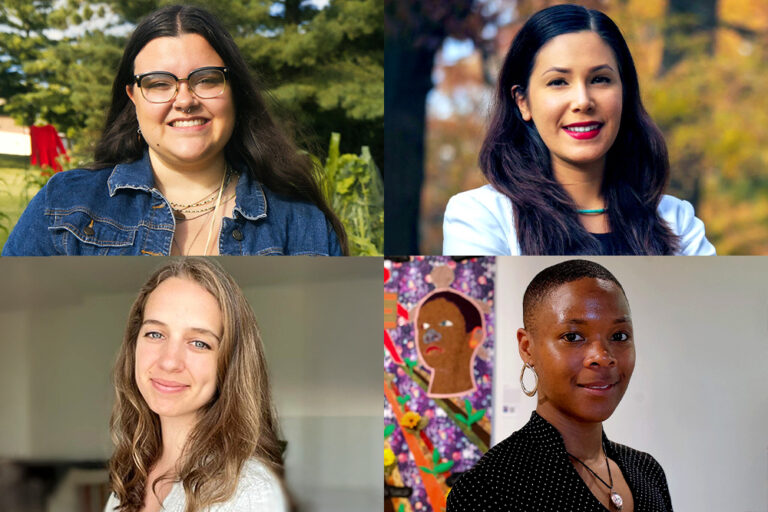“Chœurs Atlantiques | Tales from the Atlantic Beyond,” a documentary produced and directed by Safoi Babana-Hampton, Professor of French and Francophone Studies in the Department of Romance and Classical Studies at Michigan State University, is reaching audiences worldwide through an expanding series of film festival screenings, including a screening in Michigan on Friday, Sept. 12, and at one of the top film festivals in Europe that focuses on Africa and the African diaspora. The film also won Best International Documentary Award at one festival.
At the heart of “Chœurs Atlantiques” is Babana-Hampton’s effort to uncover the silenced stories of the transatlantic slave trade and its lasting impact on the Francophone Afro-Caribbean world by bringing together artists, historians, and policymakers to challenge Eurocentric narratives and to reclaim and preserve the memory of the Black Atlantic experience beyond dehumanizing accounts.

The film won the Best International Documentary Award at the NOVA Fest (Northern Virginia International Film Festival) in April 2025.
This Friday, Sept. 12, the documentary will screen at the 10th Annual Royal Starr Film Festival in Birmingham, Michigan, giving Michigan audiences a chance to experience the film on the big screen. The Greater Cleveland Urban Film Festival, which offers both in-person and virtual screenings, is featuring the film as one of its virtual screenings beginning on Sept. 22, 2025.
Funded in part by MSU Humanities and Arts Research Program (HARP) Large-Scale Development Grant and bringing together a transnational team of media, cultural, academic, and political personalities, the 119-minute documentary takes viewers on an immersive memory journey to three continents, beginning at the Bay of Diamant in Martinique and traveling to Guadeloupe, France, and Senegal, shining a light along the way on what it means to be Black in today’s globally interconnected world.

“Chœurs Atlantiques” explores how Black and Afro-descendant artists engage with the historical legacies of the slave trade, slavery, colonialism, and racial injustice and how they use their art to advance our understanding of this history.
The film represents years of research, collaboration, and intellectual inquiry. Between 2014-2023, Babana-Hampton traveled to France, the French Caribbean, and Senegal to ask Black artists, cultural change-makers, historians, and policymakers about the fraught histories of slavery and the slave trade and how they inform contemporary visions of more just and better human futures.
“Art and culture, as the stories told by artists featured in the film remind us, have always been the most powerful tool of preservation of one’s humanity, of affirmation of one’s freedom, and of resistance to all forms of oppression because it communicates in a way that touches human minds and hearts more directly and universally than ideological and political discourses can.”
Dr. Safoi Babana-Hampton
A central theme of “Chœurs Atlantiques” is the role of art in confronting historical legacies of violence and human suffering “to inspire positive social change through a lens that is reflective of our diverse humanity.”
“Art and culture, as the stories told by artists featured in the film remind us, have always been the most powerful tool of preservation of one’s humanity, of affirmation of one’s freedom, and of resistance to all forms of oppression,” Babana-Hampton said, “because it communicates in a way that touches human minds and hearts more directly and universally than ideological and political discourses can.”

One of the inspirations for the project was the Mémorial CAP 110 in Diamant, Martinique, a striking installation by Afro-Martinican artist Laurent Valère commemorating the enslaved Africans who perished in a shipwreck off the coast of Martinique in 1830, and more generally, the thousands of enslaved Africans who were deported to Martinique as part of the transatlantic slave trade. This memorial prompted Babana-Hampton to ask how other Afro-Caribbean artists are engaging with similar histories.
“The convergence of art and history in the story of the Mémorial CAP 110 was the basis for bridging voices of artists, historians, and policymakers in this film as a primary narrative approach,” Babana-Hampton said.
“Chœurs Atlantiques” features a range of artistic and scholarly voices, including poets, musicians, visual artists, elected officials, and historians. Through their creative, intellectual, and activist work, these individuals confront the “shipwreck” of historical memory — the unknown chapters of the history of the French slave trade and colonial slavery. By revisiting and reinterpreting these histories, they seek to carve out space for a more inclusive and equitable reckoning with the past.

Bringing “Chœurs Atlantiques” to life required collaboration across multiple continents. Babana-Hampton worked with an interdisciplinary team of more than 36 scholars, artists, musicians, and media professionals from France, the French Caribbean, Senegal, and the United States.
Babana-Hampton is the first recipient of the HARP Large-Scale Development Grant, which was presented to her in 2021 to support this documentary film project. The $100,000 award is funded through MSU’s Office of Research and Innovation in support of faculty who are engaged in large-scale arts and humanities projects.
A Growing Audience
Since its premiere, “Chœurs Atlantiques” has resonated with audiences. By reclaiming hidden narratives and amplifying voices that challenge colonial frameworks, the film contributes to a growing body of work that insists on the interconnectedness of human struggles for freedom and dignity. Its reception on the film festival circuit affirms the urgency of these stories and the importance of bringing them to audiences worldwide.
Besides the NOVA Fest, “Chœurs Atlantiques” has already been screened at the College of William & Mary in Williamsburg, Virginia; the Frantz Fanon Auditorium in Fort-de-France, Martinique, as part of “Rézistans” (Resistance) at Tropiques Atrium; the ACTe Memorial “Caribbean Center of Expression and Memory of Human Trafficking and Slavery” in Guadeloupe, and at the University of Cape Town, South Africa. It also was invited to screen for young learners at high schools in Martinique.
Upcoming Screenings
“Chœurs Atlantiques” is scheduled to appear at several other film festivals across the country and world, including at the Festival International du Film Panafricain in Cannes, France, which is considered among the top film festivals in Europe that focuses on Africa and the African diaspora.
The following are the upcoming film festivals in which “Chœurs Atlantiques” will be featured at:
- Royal Starr Film Festival, Birmingham, Michigan — Sept. 12, 2025
- Oakland International Film Festival,Northeastern University, Oakland, California — Sept. 12, 2025
- Festival de Cinéma Plan d’Ensemble, Montréal, Québec — Sept. 19–21, 2025
- Greater Cleveland Urban Film Festival, offering “Chœurs Atlantiques” as a virtual screening, beginning on Sept. 22, 2025
- Global Nonviolent Film Festival — Sept. 25-Oct. 12, 2025
- I Will Tell International Film Festival, London, United Kingdom — Sept. 27, 2025
- FINIFA Film Festival, Festival Issni N’Ourgh International du Film Amazighe, Agadir, Morocco — Oct. 1-5, 2025
- New Jersey Film Festival, Rutgers University, New Brunswick, New Jersey — Oct. 3, 2025
- ECOCINE – International Environmental and Human Rights Film Festival (33rd edition), Belém, Santarém (PA), São Paulo, Campinas and São Sebastião (SP), BRAZIL — Oct. 7, 2025
- Gary International Black Film Festival, Indiana University Northwest, Gary, Indiana – Oct. 9-12, 2025
- Mondes en Vues, Festival International du Film des Droits Humains, Guadeloupe – Oct. 10-15, 2025
- Festival International du Film Panafricain, Cannes, France – Oct. 22-26, 2025
- American INSIGHT’s Free Speech Film Festival, 2025 Official Selection
As the film continues to travel around the festival circuit, Babana-Hampton hopes the stories in “Chœurs Atlantiques” continue to reach diverse audiences and contribute to public conversations around the film’s themes.
“Understanding the Black French experience, past and present, within this complex lens and through these deeply interwoven narratives, makes it possible to recognize both the agency of all historically oppressed communities as well as the interlocked nature of their fight for freedom and justice, and ultimately their endeavor to imagine and build a culture of human solidarity, as a safeguard against all threats to freedom and human dignity, beyond dehumanizing colonial models,” Babana-Hampton said. “Despite the difficult themes they navigate, the stories featured in the film are ultimately stories of hope and of human resilience, and of manifestations of beauty in the face of adversity.”
By Austin Curtis and Kim Popiolek


